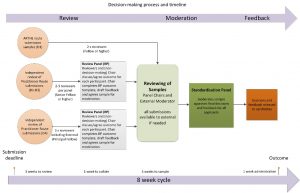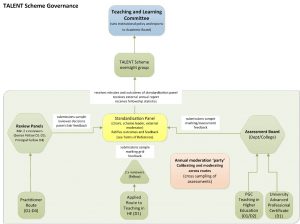REVIEW PROCESS
This section is designed to ensure you have a good understanding of the processes and timescales involved once you have submitted your application. How are decisions made and by whom? What are the different possible outcomes and what feedback and support is available to you should you not fully hit the mark on first submission? We outline our Confidentiality and Quality Assurance processes designed to make the whole scheme as rigorous, fair and effective as possible.
We sincerely hope that you are satisfied and reassured by this information but if you are unhappy about any aspect of our provision, including the decision, and want to know what steps you can take towards either appealing or making a complaint please see our Appeals and Complaints process.
Click on the image to enlarge
Who will review my submission?
Your submission will be peer reviewed by Hallam academics with significant teaching and learning experience who will form part of a Review Panel. The panel will be drawn from across the institution, reflecting different disciplines and professional backgrounds.
The panel will normally consist of three people. All panel members (reviewers) are Senior or Principal Fellows (except for D4 panels whereby all reviewers must be Principal Fellow and one must also be an external). All panel members will have undertaken specific training on decision-making for fellowship and this is refreshed annually. In addition to the reviewers, the panel will be chaired by a Review Panel Chair, who is an experienced academic with either a Senior Fellow or Principal Fellow award. Their role is to facilitate the process whereby the reviewers individual decisions become the provisional outcome. They will be responsible for safeguarding confidentiality and a fair process but will not be making their own individual judgements on submissions or have a decision-making role. They will report to the Standardisation Panel on the Review Panel process and outcomes as part of a multi-dimensional moderation process.
How will my submission be evaluated?
Your submission will be reviewed independently by all reviewers against the relevant Descriptor criteria, looking for evidence that your approach to teaching and/or supporting learning is grounded in an understanding of how learners develop knowledge and practice within your discipline or role. Your evidence should therefore be reflective, not just descriptive. They will also look for indications of how you evaluate your effectiveness and how you develop your approach in the light of your experience and continuing professional development. A holistic and appreciative approach to reviewing your application will be adopted and reviewers will seek evidence from across your application. Each reviewer will complete a proforma which includes their outcome decision and the grounds for that decision and will forward it to the Review Panel Chair who will facilitate the process by which the Panel produces a joint outcome.
A confidentiality statement is sent to all reviewers selected for each panel and members are asked to declare interests or line management relationships in advance of reading an applicant’s submission. In such a case they will be recused from the decision-making on that applicant and an alternative reviewer will be substituted.
The Review Panel Chair will ensure that considerations about a candidate beyond the content of the submission do not form part of the reviewers comments, feedback or decision-making. This will ensure that submissions are evaluated against the relevant Descriptor criteria in the PSF 2023, on the basis of what is presented only, including the referee statements.
Following discussion of each submission at the Review Panel meeting, the Chair will then produce the agreed provisional outcome and feedback using a standard proforma in preparation for the Standardisation Panel.
The Standardisation Panel (SP) is there to moderate and benchmark both the provisional decisions made and the reviewers themselves. In exceptional circumstances and only with unanimous agreement, the SP has the capacity to change provisional decisions where appropriate. The SP will consist of all (four/five) Review Panel Chairs plus an External, and the TALENT Scheme Lead. The SP approves the feedback for ‘Not Yet Awarded’ or borderline cases thereby ensuring that feedback for these applicants is constructed by a group of highly experienced reviewers, focusing especially on criterion-based feedforward. For ‘Not Yet Awarded’ participants feedback will be delivered verbally in a 1:1 alongside written feedback. This ensures the participant can clarify understanding and be clear about the requirements for resubmission.
Outcome of the decision-making process (D1 – D4)
All decisions forwarded by the Review Panel chairs are provisional until ratified by the Standardisation Panel. The Standardisation Panel (SP) meets termly and you will have to wait around 8 weeks for a decision. Following the Standardisation Panel you will be sent an email from the SP Chair containing one of two outcomes:
Award:
You have been recommended for fellowship at the descriptor level claimed. You will receive an email confirmation of this decision. At this point you may use your post-nominal letters and claim your certificate from Advance HE. Full instructions on doing this will be sent to you with the final outcome.
Not Yet Awarded:
The panels have agreed that your submission does not yet fully meet the criteria for the descriptor claimed. You will receive an email to confirm this decision including:
- a) an offer to meet with one of the Review Panel chairs for verbal feedback and guidance*
- b) written feedback will also be provided that will focus on detailing the criteria that have not yet been met and what is required by way of a resubmission.
You may find a writing retreat useful to obtain further guidance on addressing the feedback.
You can resubmit as soon as you have addressed the feedback and your resubmission will go to a new panel. However, if you have been advised to develop further evidence this may take considerably longer and you should not resubmit until you are confident that you have addressed the feedback. The facilitator at a writing retreat will be able to advise you on this.
*As part of the verbal feedback process the Review Panel Chair may offer you a ‘professional conversation’ instead of a written resubmission. This format will be offered where the Panels feel that the holistic evidence submitted appears to demonstrate that you are operating at the requisite level for an award to be made but it cannot be made due, for example, to the omission of small amounts of evidence or the meaning of a single dimension has been misinterpreted. The Panels have agreed that the remedy should be possible to achieve within a 30min professional conversation. This offer must be formally ratified at the Standardisation Panel.
Following the initial feedback and with your agreement, the Review Panel chair will arrange the professional conversation meeting and provide a small number of questions in advance. On the selected date, the Review Panel Chair and a reviewer from the original panel (for D4 this must include the External) will use the questions as prompts to elicit the required evidence from you through a relatively informal conversation. This conversation will take place online and be recorded for quality assurance purposes.
Outcomes will not be provided to you at the meeting. The Review Panel Chair will confirm the outcome with the Chair of the Standardisation Panel and, if successful, Chair’s Action will be taken. The TALENT administrator will then inform you of the outcome.
Should the conversation prove unsuccessful and the decision remains as ‘not yet awarded’, you will be given feedback as before and routed through the resubmission process as described above.
Quality Assurance
All reviewers for the Practitioner Routes D2 and D3 hold Senior or Principal Fellowship and for D1 only, hold a minimum of Fellow. Reviewers at D4 must hold Principal Fellow. They have all been trained prior to commencing the role. This includes training workshops; calibration review exercises and 4th reviewer (i.e. ‘shadow’) panel participation. This is refreshed annually via a training day which may include elements recommended by the Standardisation Panel. Individual reviewers could receive intermediary feedback from the Standardisation Panels as appropriate.
Reviewers make individual judgements on each application which are then scrutinised by the Review Panel Chair who is responsible for the process by which the individual judgements become the Panel’s provisional decision. These will be passed on as recommendations to the Standardisation Panel. This Panel will bring together the (four) review panel chairs, the TALENT Scheme Lead and the Advance HE External reviewer. They will receive a summary of all submissions outcomes (both by each reviewer and the agreed panel outcome) and a cross-sectional sample of submissions including all those Not Yet Awarded alongside a selection of borderline awards and clear awards from a variety of Descriptor categories. All D4 submissions will be included in the sample as it is a new category for this Scheme. They will moderate the decision-making process across the experiential routes. This Panel will act as the final ratification body for decisions and will report findings and make recommendations which will be passed to the Oversight Group.
To note: in exceptional circumstances only, where a clear error has taken place on the part of reviewers and the Standardisation Panel is unanimous in their view, it may change the summative outcome of the review panel. The error is likely to be brought to the attention of the Standardisation Panel by the Review Panel Chair. In the rare event of this occurring, all submissions from the relevant review panel will be looked at to ensure that no endemic issue is present. The Standardisation Panel may make recommendations to the TALENT Scheme regarding additional training or development for the reviewers concerned.
Overall responsibility for quality assurance of the TALENT Scheme is taken by the TALENT Oversight Group.
This group is chaired by the PVC for Teaching Learning & Student Success (TLSS) and brings together the TALENT Scheme Lead, the TALENT Scheme External, a key stakeholder from the Researcher and Innovator Development Academy (RIDA), College Associate Deans for Teaching & Learning, the Dean of Students, the PGCTHE Course Leader and the Principal Fellow Network Chair. It receives the annual report from the Scheme External and further reports regarding annual data and evaluation. It oversees and signs off on the annual report to Advance HE. The Oversight Group will not review or evaluate individual submissions but quality assure the whole process. Key outcomes or issues can be escalated to the University Learning & Teaching Committee a sub-committee of Academic Board.
Click on the image to enlarge
Confidentiality
You can be assured that there is a good understanding of the sensitive nature of making judgements on colleagues’ practice. This applies to all aspects and elements of the scheme, whether it is the processes of administration or the provision of support and guidance. All people involved in supporting the work of the TALENT scheme will treat all identifiable information in the strictest confidence.
For example, all the proceedings of review panels are confidential at all stages of the process. A confidentiality statement is sent to all reviewers selected for each panel and members are asked to declare interests or line management relationships in advance of reading an applicant’s submission. In such a case they will be recused from the decision-making on that applicant and an alternative Reviewer will be substituted.



